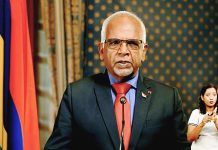Africa-Press – Mauritius. The COVID19 pandemic has propelled the world into one of the most serious health and economic crises in history. It further complexifies the significant challenges faced by fragile countries in general, and the African continent in particular.
It comes at a time when the budgets of several countries are already in a predicament, suffering from the severe impact of common security challenges and climate change.
We are faced with an unprecedented and sudden drop in budget revenues, but a large share of expenditures, such as the day-to- day functioning of our institutions, the fight against many endemic diseases, the maintenance of other priority social expenditures, and the fulfilment of our financial commitments, remain incompressible.
Let me begin by commending the strong and rapid international mobilisation in response to the crisis. The recent measures in favour of low-income countries and the April 15th agreement by the G20 are a clear illustration of this.
However, while the policies and instruments implemented to support developed economies have been aimed at immediately mobilising new financing to limit the economic impacts of the crisis, the measures adopted for Africa have focused either on debt write-offs or moratoriums on the servicing of bilateral public debt.
These solutions, despite the immediate budget relief they provide, (i) do not respond to the aforementioned challenges and (ii) have significant consequences in the short- and medium-term.
Indeed, government expenditures are expected to expand rapidly to counter the spread of the pandemic, while continuing to address development challenges.
In addition, the significant reduction in revenues further reduces budget allocation. Debt relief or moratorium solutions demonstrate creditor leniency, but they do not structurally solve our countries’ challenges.
Furthermore, these solutions will further tarnish the reputation of our governments and jeopardize their access to future financing. Our countries will suffer from an implied deterioration of their perceived credit quality, which could impact their access to capital markets.
A moratorium, whether desired or imposed, could even be considered in some loan documents as an event of default by private creditors, even if it only concerns bilateral public creditors.
In addition to sanctions from rating agencies for defaulting on loan repayments, all our countries’ efforts to improve both the business climate and the perception of risk (as presented in the OECD classifications and used to define the terms of many loans) would be simply destroyed.
Let us recall that following the HIPC initiative, debt write-offs in the past decade left deep wounds both for private creditors and public bilateral lenders; many never returned to finance our countries, except through grants.
Yet, given the weakness of domestic and private sector savings, sound debt provided at affordable cost and long maturity is essential to put our economies on the path of long-term sustainable growth.
With this in mind, I would like to elaborate on the following proposals, expressed in a letter addressed this week by President Patrice Talon to the Managing Director of the International Monetary Fund and the President of the World Bank:
Africa’s urgent needs amount to $100 billion (including $44 billion for debt service). A new allocation of IMF Special Drawing Rights, an actively debated idea currently, should be considered.
It would provide a rapid and effective response to fulfil the needs of the most vulnerable countries, while preserving the sustainability of their debt.
This solution is not new and was successfully implemented during the previous global financial crisis in 2008, when $250 billion were swiftly released. Moreover, the significant liquidity recently injected by central banks in the developed world is edifying.
Multilateral institutions and development banks should use their creditworthiness to extend additional concessional and semi-concessional financing to African economies, given that their access to near-zero interest rate financing is intact, unlike for African countries.
Collectively, development institutions could mutualise their credit qualities in a new ad hoc vehicle, dedicated to a reconstruction plan of unprecedented scale for our countries.
The European Stability Mechanism could serve as a valuable source of inspiration for establishing a supranational vehicle with preferred creditor status and uniting development partners.
This mechanism could propose several types of programs tailored to the specificities of each country, ranging from precautionary lines for countries subject to refinancing risks to financing lines for major investment programs for countries with robust macroeconomic fundamentals.
For example, development partners could focus their efforts on large-scale investments to significantly reduce the gap in basic infrastructure. For countries with unsustainable debt, such a vehicle could buy back debt at a discount in order to secure low-cost debt relief and avoid future debt restructuring, which often have disastrous economic consequences.
Finally, calls for debt relief carry a sense of “déjà vu” with controversial results. Adequate and responsible debt support seems to me a more convincing solution than a call for indulgence.
It is also critical that such a support system be used to respond to concrete needs with utmost efficiency, the prerequisite being the transparency of public finances and debt management.
For More News And Analysis About Mauritius Follow Africa-Press







